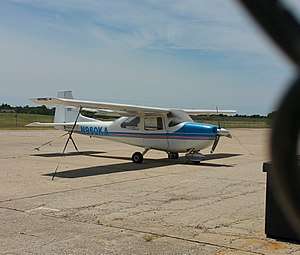Kestrel KL-1
The Kestrel KL-1 is an American single-engined four-seat utility aircraft designed and built in the 1990s by the Kestrel Aircraft Company of Norman, Oklahoma.
| KL-1 | |
|---|---|
 | |
| Role | Single-engine utility aircraft |
| National origin | United States |
| Manufacturer | Kestrel Aircraft Company |
| First flight | November 19, 1995 |
| Number built | 3 |
Design and development
The KL-1 is a composite fuselage cantilever high-wing cabin monoplane designed to meet the requirements of the utility and normal categories of Part 23 of the Federal Aviation Regulations.[1] It had a fixed tricycle landing gear and a conventional four-seat cabin layout.[1] The prototype designated KL-1A and registered N960KA first flew on 19 November 1995 and was powered by a 160 hp (119 kW) Lycoming O-320-D2G piston engine driving a two-bladed fixed pitch propeller.[1]
A number of improved variants of the KL-1 were planned including an armed observation or forward air control version with underwing weapon pylons.[1]
While the prototype was test flying to gain certification the programme was abandoned.
Variants
- KL-1A
- Baseline four-seat production variant with a 160 hp (119 kW) Lycoming O-320-D2G piston engine, one built.[1]
- KL-1B
- Proposed de-luxe four-seat variant with a 190 hp (142 kW) Lycoming IO-360-ES piston engine, not built.[1]
- KL-1C
- Proposed high-performance variant with a 250 hp (186 kW) Continental TSIO-360C piston engine, 2 built.[1][2]
- KL-1D
- Proposed six-seat utility and cargo variant with a 325 hp (242 kW) Continental TSIO-550-B engine, and an optional floatplane conversion, not built.[1]
- KL-1R
- Proposed retractable landing gear variant of the KL-1B with a 190 hp (142 kW) Lycoming IO-360-ES piston engine, not built.[1]
- K250A
- Proposed military armed observation or forward area control variant of the KL-1C with additional observation windows and underwing weapons pods, not built.[1]
Specifications (KL-1A)
Data from Jane's All the World's Aircraft 1995-1996
General characteristics
- Crew: 1
- Capacity: 3
- Length: 26 ft 9 in (8.15 m)
- Wingspan: 36 ft 9 in (11.20 m)
- Height: 8 ft 11 in (2.73 m)
- Wing area: 179.6 sq ft (16.69 m2)
- Empty weight: 1,375 lb (624 kg)
- Gross weight: 2,500 lb (1,134 kg)
- Powerplant: 1 × Lycoming O-320-D2G four-cylinder piston engine. , 160 hp (119 kW)
Performance
- Cruise speed: 143 mph (230 km/h, 124 kn)
- Stall speed: 54 mph (87 km/h, 47 kn)
- Range: 1,088 mi (1,752 km, 945 nmi)
- Service ceiling: 13,000 ft (3,965 m)
- Rate of climb: 700 ft/min (3.6 m/s)
References
Notes
- Jackson 1995, p. 546
- Eckland, K.O. "Aircraft K". Aerofiles. Retrieved 13 October 2017.
Bibliography
- Paul Jackson, ed. (1995). Jane's All the World's Aircraft 1995-1996. Jane's Information Group Limited. ISBN 0-7106-1262-1.